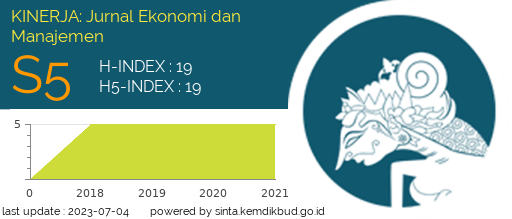Determinan kualitas laporan keuangan pemerintah daerah
Abstract
Preparation and financial reporting is an obligation that is done for every organization both private sector and public sector. This is because the financial statements serve as a benchmark to see if the performance is happening in an institution can run well and properly. This study was conducted to see the determinant in creating a higher quality financial statements because one of the requirements for a financial statement is to have adequate information and can dipahmi for each user, so that in the preparation of financial statements should be more attention to several contributing factors. In this study, trying to see what factors can influence the creation of a higher quality financial statements so as to facilitate its user. This study uses three factors that are considered to influence the improvement of the quality of the financial statements of the competence of local government human resources, utilization of information technology, as well as the internal control system within the organization which will then be processed with the help of statistical programs in the form SmsrtPLS. After testing the analysis of the three factors used in this study by using analytical tools SmartPLS result that the competence of human resources has a positive and significant impact on the quality of financial reports of local government, it can be seen from the value of t obtained which is equal to 5, 254,386. So it may be indicated that the greater the competence of an employee can impact the quality of financial reporting. As for the use of information technology factors also influence a positive and significant impact on improving the quality of local government financial statements which can be seen from the value t obtained which is equal to 2.201480. As for the internal control system has no effect on the quality of government financial statements it can be seen from the values obtained by 0.977357. And the third factor to use significant benchmark by 1.96.
Keywords: quality of financial reporting, internal control systems,human resource competencies,.
Full Text:
PDFReferences
Afriyanti, Dita. 2011. Analisis Faktor-Faktor Yang Mempengaruhi Nilai Informasi Pelaporan Keuangan Pemerintah Daerah (Studi Pada Satuan Kerja Perangkat Daerah Di Kabupaten Batang). Skripsi, Universitas Diponegoro, Semarang
Badan Pengawasan Keuangan dan Pembangunan (2007). Petunjuk Tehnis Reviu LaporanKeuangan Kementrian Negara/ Lembaga.
Badan Pemeriksa Keuangan Republik Indonesia (2007). Peraturan Badan Pemeriksa Keuangan Republik Indonesia No 1 Tahun 2007 tentang Standar Pemeriksaan Keuangan Negara.
Cheng, Rita Hartung 1992, ’An Empirical Analysis of Theories on Factors Influencing State Government Accounting Disclosure’, Journal of Accounting and Public Policy, vol. 11, issue 1, spring, pp. 1-42
Celviana, Widianingrum, Rahmawati, 2010. Pengaruh SDM dan Pemanfaatan Teknologi Informasi Terhadap Keterandalan dan ketepatwaktuan Pelaporan Keuangan Pemerintah daerah dengan variabel intervening pengendalian intern akuntans, studi empiris, di pemda subosukawonoseraten, Simposium Nasional Akuntansi XII Purwakarta.
Evans, J., Patton, J., 1987. Signaling and monitoring in public sector accounting.
Journal ofAccounting Research 25 (Supplement), 130–158.
Foster, Bill. 2001. Pembinaan untuk Peningkatan Kinerja Karyawan. PPM : Jakarta
Freeman, Robert J., and Shoulder, Craig D.. (2008). Governmental and Nonprofit Accounting Theory and Practice. Ninth Edition. New Jersey: Pearson International Edition
Hariandja, M.T.E, 2002, Manajemen Sumber Daya Manusia ,Grasindo, Jakarta.
I Gusti Agung Rai. 2010. Audit Kinerja Pada Sektor Publik. Jakarta: Selemba Empat.
Indriasari, Desi (2008). ”Pengaruh Kapasitas Sumberdaya Manusia, Pemanfaatan Teknologi Informasi dan Pengendalian Intern Akuntansi terhadap Nilai Informasi Pelaporan Keuangan Pemerintah Daerah”. Kumpulan Artikel Simposium Nasional Akuntansi (SNA) XI Pontianak 2008
Kiswara, Endang, 2011, Nilai Relevan Dan Reliabilitas Kegunaan-Keputusan Informasi Akuntansi Menurut Sfac No. 2 Dalam Penyajian Laporan Keuangan Dengan Metode-Metode Pembebanan Pajak Penghasilan Berbeda. PhD thesis, Universitas Diponegoro, Semarang.
Mardiasmo. 2009. Akuntansi Sektor Publik. Yogyakarta : ANDI.
Moekijat. Prasojo. 2011. Pengantar Sistem Informasi Manajemen Bandung: Remadja Karya.
Mainardes,E.W., Alves, H. and Mario Raposo. 2011. “Stakeholder theory: isssue to resolve”. Management Decision vol 49 No. 2, 2011, 226-252.
Raposo, Mário. 2011. Entrepreneurship education: Relationship between education and entrepreneurial activity. Psicothema 2011. Vol. 23, nº 3, pp. 453-457. ISSN 0214 - 9915 CODEN PSOTEG
Sugiyono. 2011. Statistika untuk Penelitian. Bandung : Alfabeta.
Tuti Herawati. 2014. Pengaruh Sistem Pengendalian Intern Terhadap Kualitas Laporan Keuangan (Survei Pada Organisasi Perangkat Daerah Pemda Cianjur). Star- Study & Accounting Research Vol Xi No 1 2014 ISSN: 1693-4482.
Watts, Ross L. and Jerold L. Zimmerman. (1990). Positive accounting theory: A ten year perpective. The Accounting Review. 65:131-156.
Wibowo. 2011. budaya organisasi : sebuah kebutuhan untuk meningkatkan kinerja jangka panjang , Jakarta: Rajawali Pers.
Wilkinson Joseph W. (2005), Sistem Akuntansi dan Informasi, Penerbit Erlangga.
Wilkinson, Josep W. Et al, 2000. Accounting Information System Essential Concept and Application, 4 Edition, John Willey & Sons Inc, New York-USA.
Zuliarti. 2012. Pengaruh Kapasitas Sumber Daya Manusia, Pemanfaatan Teknologi Informasi, Dan Pengendalian Intern Akuntansi Terhadap Nilai Informasi Pelaporan Keuangan Pemerintah Daerah: Studi Pada Pemerintah Kabupaten Kudus. Skripsi. Fakultas Ekonomi, Universitas MuhMuria Kudus.
DOI: https://doi.org/10.30872/jkin.v13i1.362
Refbacks
- There are currently no refbacks.
Copyright (c) 2016 indra kurniawan
Kinerja: Jurnal Ekonomi dan Manajemen
Faculty of Economics and Business, Mulawarman University
Jl. Tanah Grogot No.1 Samarinda Kalimantan Timur 75119
Email: jkin.feb.unmul@gmail.com
StatCounter: Kinerja


